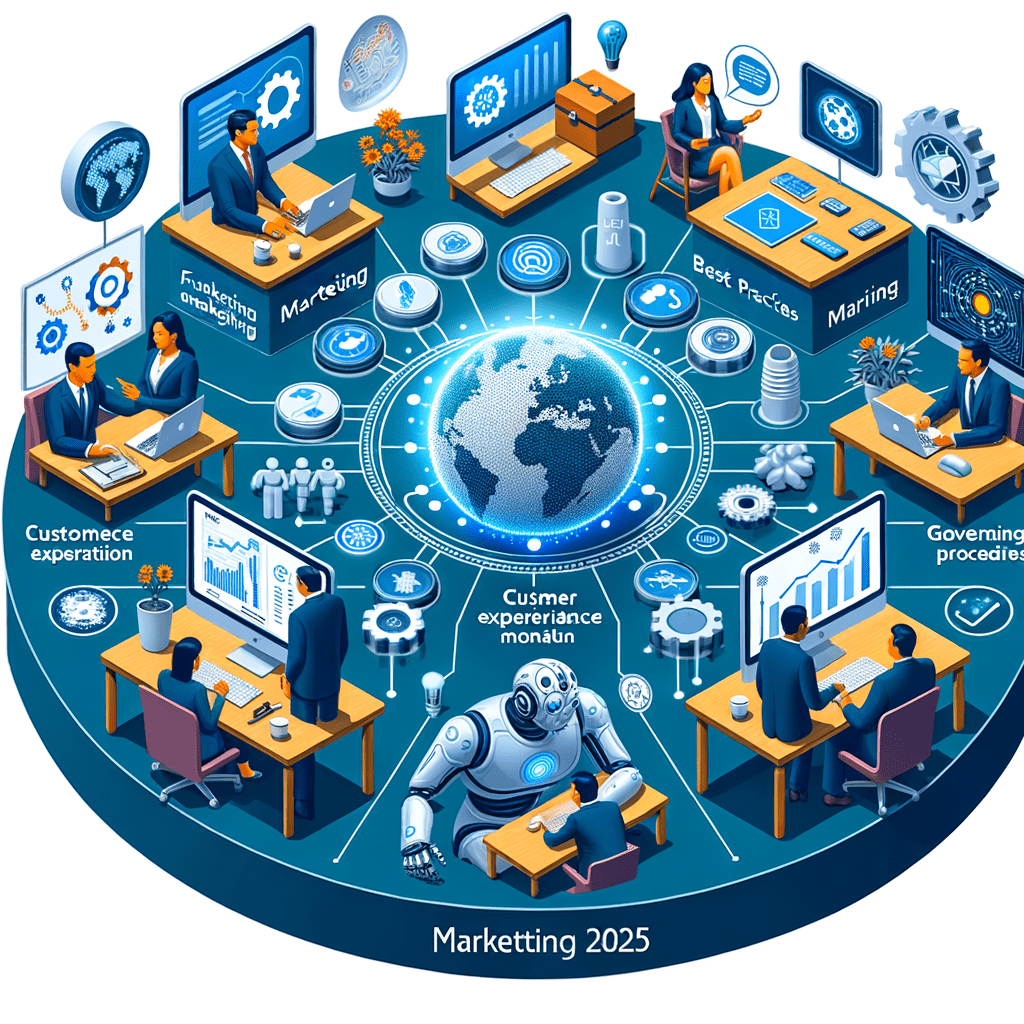Feeling overwhelmed by the AI buzz in marketing? You’re not alone. How AI is reshaping the marketing and Martech environment is a hot topic. Many articles, webinars, and experts promise to reveal AI’s secrets. Let’s be realistic: this is about practical applications helping you achieve goals. This post will discuss those applications and valuable insights.
This isn’t science fiction. The transformation of marketing and Martech by AI is happening now. We must understand how AI works in marketing and its limitations. Human creativity remains essential for digital marketers.
How AI is Reshaping the Marketing and Martech Environment
The Martech landscape grew by nearly 28% in 2024, according to Scott Brinker and Frans Riemersma. AI tools significantly contributed to this growth. This rapid expansion presents challenges, particularly as AI can feel intimidating, especially with job market concerns.
Five Ways AI is Changing Martech
AI’s influence extends beyond new tools. It’s transforming the structure of marketing technology. AI presents new opportunities for marketing automation.
- Indie Tools: Small, AI-powered tools automate marketing tasks. These complement larger platforms by automating specific functions, impacting areas like mobile marketing and email marketing.
- Challenger Platforms: AI-native startups challenge established companies. These startups redesign core systems. Consider how Clay is changing traditional prospecting data intelligence and how 11x is using AI agents. Marketers using AI can dig deeper into the details.
- Incumbent Platforms: Established Martech players, including Adobe, HubSpot, Microsoft, and Salesforce, integrate AI. They leverage AI through acquisitions, enhancing features like content generation and programmatic advertising.
- Instant Software: AI empowers no-code app creation and on-the-fly software development. This unlocks vast customization, making “software” an almost infinite resource. Digital transformation allows brands to stay relevant and allows for a composable approach to data management.
- Services-as-a-Software: AI creates outsourced services. This shifts the focus from software/labor to outcomes — leads, views, or purchases. Invest in services rather than in-house tools, improving user experience. This shift allows businesses to focus more on customer data platforms.
The Foundation: Data and APIs
A robust AI strategy requires strong data, according to GrowthLoop CEO, Chris O’Neill, when discussing End-to-End Marketing on Your Data Cloud with AI. Modern data stacks leverage cloud data warehouses and lakes. Tools like Hightouch connect to these data clouds, enhancing marketing analytics with machine learning.
This forms the Composable CDP, providing flexible data access while centralizing information. MetaRouter syncs first and third-party IDs for better CDP activation, offering better insights into customer data on an individual level. Improved APIs are crucial for AI agents. These enhance integration with other software, making AI technologies more flexible for effective marketing and digital advertising.
GenAI: Popular Use Cases for 2025
According to a Chiefmartec/MartechTribe survey, AI is more than hype. Marketers actively employ AI tools for tasks such as content marketing, data analysis, and management. AI marketing tools are becoming increasingly popular for marketers.
| Use Case | Frequency |
|---|---|
| Content (Copywriting, Optimization) | 51% Daily/Weekly |
| Data Analysis (“Chat with Data”) | 23% Daily/Weekly |
| Meeting Summaries/Transcription | 43% Daily/Weekly |
This shows genAI’s influence across marketing tasks. Generative AI is integrated into many platforms. Marketers also experiment with separate tools. AI tools allow brands to gain insights from their proprietary data and enhance their martech stacks.
Governance and Education: A Critical Gap
AI adoption grows, but governance lags. Few marketers have a generative AI policy, as highlighted in the Marketers and GenAI report from SAS. This calls for greater consideration of ethical AI and how it relates to consumer trust.
A robust AI framework should include ethics, privacy, data protection, quality, training, education, legal compliance, and oversight. Many marketers lack training. Jonathan Moran of SAS suggests focusing on value. The combined use of AI tools and human creativity can strengthen outcomes. Data platforms become integral in managing customer service and providing the utmost in marketing operations.
FAQs about How AI is Reshaping the Marketing and Martech Environment
How is AI reshaping marketing?
AI transforms marketing through task automation, such as content creation, data analysis, and campaign optimization. This enhances personalization and performance. Businesses gain better insights into customer behavior and personalized interactions. Marketing automation also streamlines the marketing attribution process.
Starting with a strong data strategy underpins your entire AI marketing strategy. AI helps save time and marketing customer relations management (CRM) to build trust. This enables more time spent crafting unique campaigns for each segment and addressing specific needs. Generative AI can aid marketing management too.
Is AI part of MarTech?
Yes, AI is becoming a core part of MarTech. AI tools span various categories from advertising marketing and marketing automation to customer relationship management (CRM). This includes smart assistants, ad optimization, predictive analytics, personalized content, and campaign automation.
What is the role of AI in shaping the future of digital marketing?
AI allows for outcome-driven data strategies, notes Chris O’Neill of GrowthLoop. This transformation emphasizes technology and human ingenuity. The human element is critical in effective marketing and for gaining additional valuable insights into marketing data.
How has artificial intelligence impacted advertising and marketing?
AI has improved the speed and efficiency of advertising marketing and marketing automation, enabling faster marketing management at scale. Streamlining tasks and improving accuracy in various fields from medical diagnoses to the automotive industry highlights the technology’s reach.
AI tools are aiding marketers to scale their operations, specifically marketing operations. AI simplifies data analysis and reduces manual tasks leading to reduced costs, better allocation of resources, and identification of market trends, allowing a deeper dive into customer data to gain actionable insights into the evolving customer. Personalization at scale across all digital advertising channels is one key area of enhancement. Further enhancement has occurred with automated responses, augmented reality and the automation of processes such as repetitive tasks involved in mobile marketing.
Concluding Thoughts on the Key Insights
Hollywood’s portrayal of AI doesn’t reflect reality. AI aids marketers with daily tasks and improves customer experiences. Marketers face new data challenges. This demands a balanced, data-driven approach.
Maintain human involvement for creativity. AI’s reshaping of the Marketing and Martech environment offers significant potential. How AI is reshaping the marketing and martech environment is rapidly changing how marketers connect with consumers. AI offers opportunities for improved content marketing and marketing automation marketing across various channels.
A comprehensive 2025 Martech report discussing these impacts can be downloaded here.






